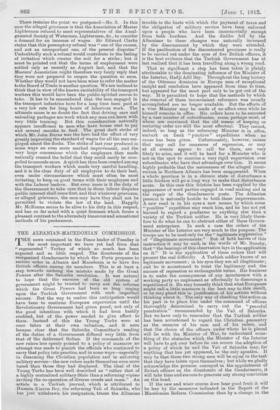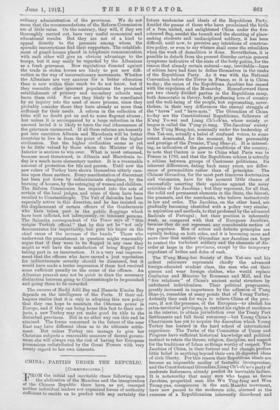THE ALBANIAN - MACEDONIAN COMMISSION.
THE news contained in the Times leader of Tuesday is the most important we have yet had from that " regenerated " Turkey of which so much has been expected and so little reaped. The directorate of the reorganized Gendarmerie by which the Porte proposes to restore order in Albania and Macedonia is to have five British officers among its members. This is at least a step towards undoing the mistake made by the Great Powers after the Salonika revolution. It was natural to hope that the enemies of the old system of government might be trusted to carry out the reforms which the Great Powers had been so long urging upon the Turkish Government with such imperfect success. But the way to realize this anticipation would have been to continue European supervision until the Revolutionary Government had given proof, not only of the good intentions with which it had been hastily credited, but of the power needed to give effect to them. Instead of this the Young Turks were at once taken at their own valuation, and it soon became clear that the Salonika Committee's reading of the duties of a Government differed very little from that of the dethroned Sultan. If the commands of the new rulers less openly pointed to a policy of massacre no attempt was made to punish the officials who continued to carry that policy into practice, and in some ways—especially in disarming the Christian population and in enforcing military service—the new rulers made themselves even more bated than those they had displaced. The ideal of the Young Turks has been well described as " rather that of a. highly centralized military State than a reforming regime inviting the co-operation of diverse creeds and races." An article in a Turkish journal, which is attributed to Hussein Kiazim Bey, the reforming Vali of Salonika, who has just withdrawn his resignation, traces the Albanian trouble to the haste with which the payment of taxes and the obligation of military service have been enforced upon a people who have been immemorially exempt from both burdens. And the dislike felt by the Albanians to these changes was naturally increased by the disarmament by which they were attended. If the pacification of the discontented provinces is really to be carried out under the eyes of five British officers, it is the best evidence that the Turkish Government has at last realized that it has been travelling along a wrong road.
That so significant a step has been taken is .plainly attributable to the dominating influence of the Minister of the Interior, Hadji Adil Bey. Throughout the long history- of the Ottoman dominion in Europe men of exceptional insight and resolution have appeared from time to time, but appeared for the most part only to be got out of the way. It is permitted, to hope that the methods by which the removal of these inconvenient reformers was usually accomplished are no longer available. But the efforts of a wise Minister may be made of no effect even -while he himself remains in office. His orders have to be executed by a vast number of subordinates, some, perhaps most, of whom are convinced that the old means of keeping or restoring order are still the most effectual. They cannot, indeed, so long as the reforming Minister is in office, embark on fresh " punitive " expeditions when no cause has been given. Unfortunately, however, causes that may call for measures of repression, or may at all events appear to call for them, are very likely to arise, and it will be hard for a Minister who is not on the spot to exercise a very rigid supervision over subordinates who have that advantage over him. It seems highly probable that the seriousness of the alleged insur- rection in Northern Albania has been exaggerated. When a whole province is in a chronic state of disturbance a, little friction will go a long way to make that disturbance acute. In this case this friction has been supplied by the appearance of work parties engaged in road making and in the repair of the Gendarmerie posts. The Albanian peasant is naturally hostile to both these improvements. A new road is in his eyes a new means by which some " punitive " expedition may reach him, and he has not yet learned to regard a gendarme as anything else than a variety of the Turkish soldier. He is very likely there- fore to do what he can to obstruct either of these Govern- ment enterprises. In such a case the orders of the Minister of the Interior are very much to the purpose. The troops are to be used only for the " legitimate suppression " of " illegitimate movements." But of both halves of this instruction it may be said, in the words of Mr. Bunsby, that " the bearings of this observation lays in the application on it." It is the application of these orders that will present the real difficulty. A Turkish soldier knows of no legitimate movement ; in his eyes they are all illegitimate; and he is accustomed to treat the legitimacy and the success of repression as exchangeable terms. His business is to make the consequences of any interference with a, working party so unpleasant as effectually to discourage a repetition of it. He may honestly think that what Europeans might call a little massacre is the best way to this result, or he may plead this in justification of his actions without thinking about it. The only way of checking this action on his part is to place him under the command of officers thoroughly determined to carry out the " peaceful penetration" recommended by the Vali of Salonika, But we have only to remember that the Turkish soldier has been accustomed to regard the Christian peasantry as the enemies of his race and of his rulers, and that the choice of the officers under whom he is placed will lie with the Minister of War, to understand some- thing of the obstacles which the Minister of the Interior will have to get over before he can secure the adoption of a policy of which he and the Vali of Salonika may, for anything that has yet appeared, be the only apostles. It may be that these two strong men will be equal to the task that they have taken upon themselves ; but while we gladly acknowledge the promise conveyed in the appointment of British officers on the directorate of the Gendarmerie, it will take time and success to generate any strong conviction on this head.
If the new and wiser course does bear good fruit it will be less by the measures indicated in the Report of the Macedonian Reform Commission than by a change in the ordinary administration of the provinces. We do not mean that the recommendations of the Reform Commission are of little value. On the contrary, they will, if they are thoroughly carried out, have very useful economical and educational results. But they are not of a kind to appeal directly to the peasants among whom the sporadic insurrections find their supporters. The establish- ment of guard-houses placed in telephonic communication with each other will give an obvious advantage to the troops, but it may easily be regarded by the Albanians as a fresh grievance. New regulations directed against the trade in stolen horses are likely to put new diffi- culties in the way of insurrectionary movements. Whether the Albanians are very anxious for a better education than is now within their reach we do not know, but if they resemble other ignorant populations the promised establishment of primary and secondary schools may leave them cold. Nor are they likely to be conciliated by an inquiry into the need of more prisons, since they probably consider those they have already as more than sufficient for their needs. A reform in the collection of tithe will no doubt put an end to some flagrant abuses ; but unless it is accompanied by a large reduction in the amount levied it is likely to leave the real irksomeness of the grievance unremoved. If all these reforms are honestly put into execution Albania and Macedonia will be better countries to live in from the point of view of the higher civilization. But the higher civilization seems as yet to be little- valued by those whom the Minister of the Interior is anxious to win over. What is most esteemed, because most threatened, in Albania and Macedonia to- day is a much more elementary matter. It is a reasonable amount of protection for life and person. Until now the new rulers of Turkey have shown themselves utterly care- less upon these matters. Every manifestation of discontent has been put down by indiscriminate slaughter, by the burning of houses, by the outraging of women and children. The Reform Commission has inquired into the acts of certain of the local judges, and some of them have been recalled to Constantinople. The Vali of Salonika has been especially active in this direction, and he has insisted on the displacement of certain officers of the Gendarmerie who have taken part in the public floggings which have been inflicted, not infrequently, on innocent persons. The Salonika correspondent of the Times says of " this unique Turkish official" that by this act ho "not only demonstrates his impartiality, but puts his finger on the chief cause of the increase of the bands." Those who underwent the punishment in question might reasonably argue that if they were to be flogged in any case they might as well have the satisfaction of being flogged for taking part in an insurrection. It is a very real improve- ment that the officers who have earned a just reputation for indiscriminate severity should be dismissed, but it would have made a better impression if these had received some sufficient penalty on the scene of the offence. An Albanian peasant may not be quick to draw the necessary distinction between going to Constantinople to be punished and going there to be rewarded.
The success of Radii Adil Bey and Hussein Kiazim Bey depends on the intelligence of the Porte. If their col- leagues realize that it is only in adopting this new policy that they can hope to maintain the Ottoman power in Europe, and if they can bring home this fact to their sub- jects, a new Turkey may yet make good its title to the disturbed provinces. But in no other way can this end be attained. The forces concerned in the future of the near East may have different ideas as to its ultimate settle- ment. But unless Turkey can manage to give her Christian subjects a reasonable measure of decent govern- ment she will always run the risk of having her European possessions redistributed by the Great Powers with very scanty regard to her own interests.







































 Previous page
Previous page